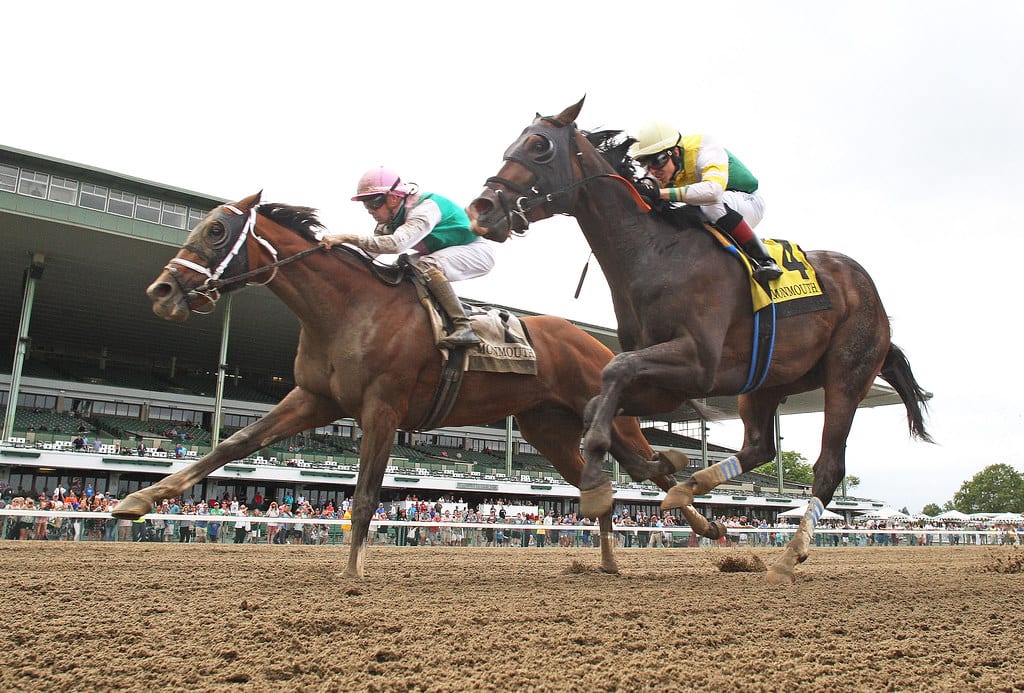NJ WHIP RULES REMAIN CONTENTIOUS

The newly established stricter rules governing the use of the riding crop at Monmouth Park have spurred a cycle of threats and recriminations crying out for compromise. Whether one will be forthcoming, however, remains to be seen.
Last November, without much warning, the New Jersey Racing Commission adopted rules prohibiting jockeys from using their whips “at any time and for any reason, except when necessary for safety,” according to a summary of the regulations published by the Commission.
The Commission’s move spurred the Jockeys’ Guild to file suit, and jockeys to bandy about the idea of a boycott. It prompted Dennis Drazin, head of the company that manages Monmouth for the state’s horsemen, to suggest he’d sue jockeys who didn’t show up.
And finally, it’s resulted in the Jockeys’ Guild announcing it would no longer provide insurance coverage for riders at New Jersey’s tracks.
According to Terry Meyocks, the president and chief executive officer of The Jockeys’ Guild, many of his members are angered by the rule – and some are following through on the threat to avoid the Shore track. Meyocks is hopeful an accord might be reached.
“We’re willing to work out something,” Meyocks said. “Nobody wants to see the jockeys away from Monmouth Park. We asked the commission (the NJRC) for a delay, but they refused.”
Most of the leading riders from prior years are back riding at Monmouth, but not all. Joe Bravo – known as Jersey Joe – was second among Monmouth riders in purse earnings last year and has been the meet-leading rider there 13 times but will not race there this year. Nor will Antonio Gallardo, who was fifth in purse earnings in 2020.
Bravo, Meyocks, and other jockeys, including Hall of Famer John Velazquez, say the issue is safety. They claim that the New Jersey rule has the effect of forcing riders to wait for a problem to emerge, which could prove disastrous.
“There’s such a quick movement that horses do,” Bravo told Horse Racing Nation. “It’s a horse race. And if you have to second judge your judgment in any manner during the race, well before you know it, it’s already too late. And God forbid turf racing. You see your horse go from last to first in the last five jumps. You have to make sure you can control them going between horses. If there’s any certain movement either way and you can’t control them with the crop, it’s too late. They’re saying we can use the reins, well, when you have movement like that, you’ve got to keep that forward movement going.”
- Midlantic-breds to tackle Wood Memorial, other Big A stakes
 Horses bred in Maryland, Virginia and Pennsylvania will tackle Saturday’s Wood Memorial, Carter, and other Aqueduct stakes.
Horses bred in Maryland, Virginia and Pennsylvania will tackle Saturday’s Wood Memorial, Carter, and other Aqueduct stakes.
Meyocks said that his group convened a conference call before the beginning of the Monmouth meet on which the crop rule was broadly panned. Some of the other top jocks in the conversation included Julien Leparoux, John Velazquez, Mike Smith, and Javier Castellano.
“I think we all felt it was a safety issue more than anything,” Meyocks said. “We’ve been working with a new crop where the horses aren’t being cut up. It’s definitely equine-friendly.”
Others in the industry, while acknowledging the safety issues, have concerns of their own, especially about wagering handle and competitive integrity.
“I think it’s going to end up being costing more money in the long run,” said Cameron Beatty, one of the owners of the 2020 New Jersey-bred Horse of the Year Horologist. “I think there’s going to be a big fall in handle. How do you make a ruling that’s supposed to be for the safety of the horse and they never asked anyone who are the closest to the horses? The ones making the decisions have probably never been atop a horse.”
“I can’t see this being a positive thing for racing,” said Riley Mott, the son of Hall of Fame trainer Bill Mott and his father’s chief assistant in the barn. “From a trainer’s perspective, we always want the utmost best for our horses. Speaking for our barn, we have not had a horse get hurt from a jockey overusing the crop. I would have loved to have been a fly on the wall to hear what the members of the (NJRC) were talking about.”
Perhaps the rule change will have negative impacts on wagering handle, but at this point, it’s hard to see. Though handle through the first 13 cards of the meet is down from 2019 – the last comparable year, excluding the Covid-flavored 2020 meet – that likely has more to do with the configuration of the meet’s opening weeks than it does whips.
In 2019, the track had opened several weeks earlier, to coincide with the Kentucky Derby, and its first 13 cards included only a single eight-race Friday card, while the other 12 days were all Saturdays, Sundays, or a holiday Monday. This year four of the first 13 cards have been six-race Friday twilight cards.
Comparing only Saturday, Sunday, and holiday cards, Monmouth is averaging more than $3.6 million in daily average handle. That’s down just 3% versus 2019. That’s not great, of course, but it belies the notion that the wagering public will turn its back on whipless racing.
Advocates of the rule can point to the relatively flat handle as one argument in the rule’s favor. They can also point to what’s been a clean start to the meet: not a single horse has been disqualified in these first cards, and no jockeys have had any action taken against them, according to the New Jersey Racing Commission and Association of Racing Commissioners International websites.
“Such… competitive horses and riding… all without using the whip for encouragement?!?!” veterinarian Kathryn Papp mock-marveled on Twitter.
Wow….such safe racing….competitive horses and riding……all without using the whip for encouragement?!??❤️? https://t.co/zXmLzDTwMx
— Kathryn Papp DVM (@kathrynpapp) June 20, 2021
- Coal Battle’s West Virginia connection
 Kentucky Derby contender Coal Battle has a couple of big fans in West Virginia, whose connection is through the horse’s WV-bred dam.
Kentucky Derby contender Coal Battle has a couple of big fans in West Virginia, whose connection is through the horse’s WV-bred dam.
And Sid Gustafson, another veterinarian who, like Papp, has been a supporter of the rule, called a Monmouth race “hand-ride heavenly” and approvingly retweeted a comment that “whipping [horses] and forcing them to dig in when tired, sore or sour is unsafe.”
A horse should only be as competitive as their soundness,fitness and desire allows. Whipping them and forcing them to dig in when tired,sore or sour is unsafe.
— envrv (@envrv1) May 29, 2021
Still, the argument that the jockeys should at least have a chance to weigh in on rules that affect them prior to adoption has resonance. They are, after all, the ones who take the risks each day.
The Jockeys’ Guild’s Meyocks points to a rule the Kentucky Horse Racing Commission adopted June 22 as a better model. That rule, the result of a lengthy process leading to what Meyocks called “a fair compromise,” limits jockeys to six overhand strikes of the whip with no more than two in succession and limits the windup a rider may employ.
The minimum penalty for a first offense is either a $500 fine or a three-day suspension. In New Jersey, the rule calls for the jockey to forfeit his or her share of the purse if, in the opinion of the stewards, the horse achieved a better placing as a result of the overuse of the whip.
Meyocks said that he believes that riding crops are “are safe and good for everyone” and rules like the new Kentucky reg are the right approach to balance the welfare of horse, rider and the competition itself. That balanced approach, he said, is what the New Jersey Racing Commission missed out on.
“The jock knows what’s best for the horse,” Meyocks said. “If a jock improperly hits a horse, then he should be penalized. The sad thing is that the Commission didn’t ask a single jockey their opinion about it.”
Repeated calls to the NJRC seeking comment about the rule were not returned by press time. Officials from Monmouth Park declined to comment, citing that the rule was still under appeal in the court system awaiting a final outcome.
A complicating factor for the whip rules is what the future may hold. While Meyocks criticizes both this rule and the plethora of different rules in different racing states, it may become moot when the national oversight board set up by the Horseracing Integrity and Safety Act launches in 2022. That board is expected to take up crop rules as part of its purview.
And there’s another underlying dilemma. The crop rule is in place – but according to some horsemen involved at Monmouth who requested anonymity, it may not be being enforced by stewards. “There have been stewards who told some jockeys that they’re not going to enforce the rule,” said one prominent trainer. “If that’s the case, then why bother at all?”
LATEST NEWS
















Nobody has mentioned the fact that as bettor’s we want our jockey to achieve the best possible placing, which now makes Monmouth not playable. I don’t even look that way anymore, one of my pet peeve’s has always been jockeys failure to persevere.
That has not escaped my notice either,
“show” may not pay the jock a lot but it may
pay a Trifecta player plenty.
Everybody knows that this is a PC thing,
Libralism run rampant in the Garden State.